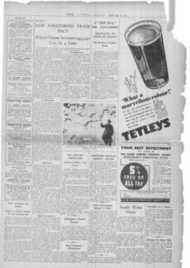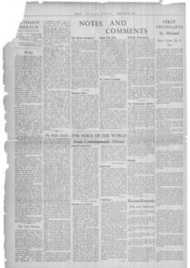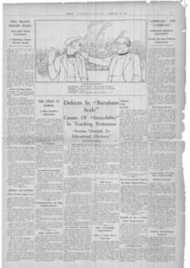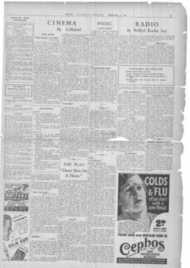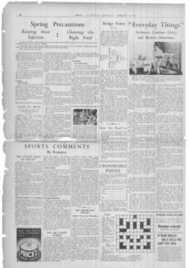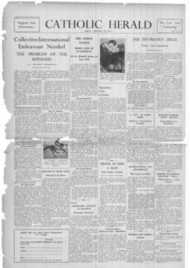Page 4, 28th February 1936
Page 4
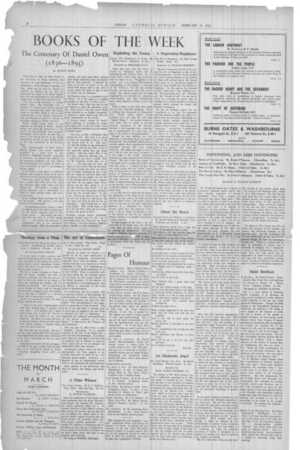
Report an error
Noticed an error on this page?If you've noticed an error in this article please click here to report it.
Tags
Share
Related articles
The Po Ys Brothers
Fiction Brett Young's Gift Book
Contemplative
Criticism
Rugged Realities From Cowper Powys
A Depressing Happiness
The Art of Happiness. By John Cowper Powys. (Lane. 6s.) Reviewed by FRANCIS BURDETT The main impression derived from reading The Art of Happiness is one of profound depression. For Mr. Powys, goaded by a sort of general despair (to say nothing of those own private devils that harass him), seeks by an intelleotual sleight-ofhand to cheat himself into the illusion of happiness. To this end he has invented certain " ritual acts "-the " Ichthian act," the " De-incarnation act," the " Panergic act," the " In-spite-of act "-by the use of which the onslaught of misery may be repelled and a certain infusion of courage gained, which infusion he thinks and believes is happincss.
He has an immense respect for the " scepticisms of our age," he apologises when he mentions religion, he suffers evidently from his Protestant upbringing but almost, timidly, fearfully, regrets certain Catholic dootrines and would like, if he could, to believe them. " The thing called conscience ' worries him; it would seem to interfere so terribly with " happiness." For him it is " the edge-of-the-wedge of the terrible force of Evolution, pressed into a burning electric spear-head against our vitals, to compel us to bestir ourselves and Jive vitally and intensely from the focus point of our nature." And " since the Universe is totally without purpose, totally without meaning, totally without guidance, totally without reason, or justice, or mercy, or pity," etc., this conscience may well be a confounded nuisance; it complicates " the struggle to free our minds from all idea of some intelligent purpose in the universe."
And this being so the desperate attempt to achieve some sort of happiness by ritual acts commands all our sympathy. But how much we could wish, and even pray, that Mr. Powys could have the courage to be less hypnotised by the despairing crudities that rule to-day and surrender himself first to the study, and then to the acceptance, of those basic truths that obscurely he perceives in Catholicism but has never fully perceived owing, perhaps, to the distortions they have suffered in Protestant England.
About the Brave
Captain Viaud and Madame La Couture. By Thomas Washington Metcalfe. (Ivor Nicholson and Watson. 7s. 6d.) Most adventure stories have a map, and A lot of hieroglyphic signs as well; Now here's a tale that actually happened .aszt where IC rather difficult y“) tell:
But somewhere in the west of the Atlantic A ship once suffered such terrific shocks She drove the folk aboard her almost frantic By landing on the rocks.
Eventually most of them reached dry land Exhausted by the tempest, and dead-beat To find that they were on a desert island With very little sustenance to eat.
At length they were discovered by a native Who, finding bits of wreckage, made a search And having robbed them while they slept, the caitiff Just left them in the lurch.
Then VIAUD with a negro slave and Madame
Set out one tropic evening in the dark Upon a trail they didn't know from Adam To reach the British settlement, St. Mark. Their journey is a tale of deep privation Which often nearly ended in the grave, Until at length they reached their destination
Without the .negro slave.
What actually happened to the slave, you Must read the book and find out for yourself;
And if you like to read about the brave, you
Should purchase it and keep it on your shelf.
There is something in the writing that will thrill you, There's adventure and distress in every word.
Don't fail to put it on your list, now will you?
For it actually occurred. R.E.J.B.
An Elaborate Joke?
We Need Mosaic Law Now. By David Hamshere. (Werner Laurie. 7s. 6d.)
Reviewed by MGR. ALBAN GOODIER, S.J.
The purpose of We Need Mosaic Law Now is sufficiently expressed by its title. The author is troubled by the " chaos" and still more by the mutability of modern law in every sphere. This mutability is due to modern law being man-made law, substituted for the Mosaic Law, " God's Law " added in brackets every time the words are used, which was intended for all peoples and all generations. Such, the author says, was the teaching of Christ, which early Christianity mutilated, as witness the dreadful Epistle to the Hebrews.
The author then goes through the Law as read in Deuteronomy, and shows how well it could be applied to our time. For instance, polygamy would become legal, and that would cover a multitude of sins.
Honeymoons must last a year. Three times a year all men must go to Palestine, and all sorts of other things of like kind. He says the English law can be easily adapted, and as for Hindus and others, well, we must send them an ultimatum. Surely an elaborate joke! Mr. Frank O'Connor has in Bones of Contention collected twelve stories that have already appeared in various periodicals. They have a quality and distinction that places them apart. They are Irish in manner, as well as in matter, but, unlike some stories that deal with that strange race, there is no element of artificiality, no false sentiment. Each story is in fact a psychological study and carries with it immediate conviction. We may be puzzled (if the reader be English that is inevitable as well as right), but we are never tempted to cavil or disagree. The most unlikely happenings, as, for instance, the events recorded in The Man that Stopped, are easily accepted; the most blameworthy, as in A Romantic. excite „tr, It is a very notable achievement.
It would be easy to treat Journey by Candlelight unfairly. It tells the story of an old lady, living in an alms-house when the story opens, who was unexpectedly left as a legacy a country house and a small sum of money. In her youth she had an illicit love affair which ended in a quarrel and separation, though love endured on both sides. Aloof, mysterious, with great charm, she lived and relived in memory those distant happy days, and the legacy gave her the chance, by returning to the house in which they had been passed, to intensify her absorption in her dead lover.
She returns to the large, empty, deserted house and, with the help of a young woman she met in the omnibus that conveyed her there, she attempts to restart her life. Dreamy and unpractical as she was she seemed to captivate the few men that she met by her innate grace and distinguished detachment. Disaster overtakes her. In spite of much that irritates the book has a certain disarming graciousness.
Blow and Clee, however unexpectedly, turn out to be a man and a girl. Blow was a market-gardener, enormous, rustic, slow and true. Clee, the daughter of a disreputable couple living with a hoard of children in a disreputable cottage, was beautiful, gay, and in love with life. She, like her family, had no morals, and we read at great length of her " warm and
inexhaustible amorousness." She " felt herself incapable of existing except in affectionate, most intimate relationship with someone or other of the opposite sex." She indulges her desire for men, and flits delicately from one to another. In the end she returns to Blow, and both are killed by a stray German bomb.
Clee is one of those idealised heroines to which we have become so accustomed in this type of fiction. Without morals or religion or any sense of responsibility she is endowed with every virtue. She flits unscathed from lover to lover, suffers not at all, remains profoundly innocent and good-hearted (though seeking nothing hut her own pleasure) and, in fact, runs contrary to every fact of real life. It is a pity that Mr. Mann, who writes so well, has not attempted something of greater value.
In the poetic dedication prefixed to the Owl of Athene Mr. Phillpotts describes it as a fairy story. We fear that any reader who took that description seriously would be disappointed. Nothing, in fact, could well be more prosaic, and essentially less fantastic, than the substance of the book. It consists of comments on the " present discontents." Often sensible and wise enough, as when he enlarges on the powerlessness of nations to-day to ensure peace however much they may desire it, or erroneous, as when the artificial restriction of births is presented as a panacea for present evils, there is nothing very original or striking.
The fact that these views are put into the mouths of the ancient pagan gods, " the cream of the Olympian host," makes it all a little tiresome: . We feel that the gods must have lost a good deal of their ancient divinity, that perhaps old age has made them prosy, if they converse so
uninspiringly, Their conclusion, inspired by the owl, was that a universal terror, engendering a united effort at self-preservation throughout the human race, would eradicate mutual jealousies and promote a spirit of co-operation. A doubtful conclusion once the danger had passed.
Yet again in They Laugh that Win we follow the fortunes of two families, one county, one well-to-do business, in the post-war years. But Mr. Lushington has his own special_aifts, so that we read wid• pleasure though the facts are threadbare through use. There is a gaiety and insight, an awareness of beauty, and a command of language that is delightful. It cannot, in the circumstances, he a very happy story, but high spirits can be independent of stable fortunes, and faith and hope find their opportunity outside success. In spite of adversity we finish the book in a mood of couragebus expectancy.
Saint Boniface
St. Boniface. By Godfrey Kurth. Trans
lated by Mgr. Victor Day, with additions by Francis S. Betten, S.J. (Bruce, U.S.A. Caldwell, London. 8s. 6d.) Reviewed by JOSEPH CLAYTON
This is a new edition of Professor Kurth's biography of St. Boniface, its value greatly increased by Father Betten's careful additions to the text and vastly improved bibliography. Though the book belongs to the biographical literature of edification, the edifying of the reader is never sought at the expense of truth. All that is known of the apostle to heathen Germany, the west-country monk Winfrid, whom Pope Gregory II named Boniface, his missionary zeal, his charities, his scruples, his undying love of the England he left, and his devoted fidelity to the papacy is told in these pages. It deserves to be told and known. Has not Mr. Christopher Dawson insisted that St. Boniface of Crediton " had a deeper influence on the history of Europe than any Englishman who has ever lived" ? For, " unlike his Celtic predecessors, he was not an individual missionary, but a statesman and organiser, who was, above all, a servant of ths Roman order."
To St. Boniface chiefly Europe owed that " combination of Teutonic initiative with Latin order " which made medieval civilisation the wondrous thing it was, so that only in its decay was it overthrown from within by the Protestant
revolution. The fine adventurous life that brought Hesse and Thuringia into Christendom, that reformed the corrupt Frankish church-and Boniface had to deal with corruptions as great in that eighth century as any that repelled Luther in the fifteenth-and established religious houses that long were centres of faith and learning, was crowned in old age by martyrdom at the hands of the savages of Friesland. We welcome this biography.
Miracle in the Drawing-room. By Edwin
Greenwood. (Skeffington. 7s.. 6d.) There is so much excellent characterisation in the earlier part of the book that one sighs to see the Cantlowes popped into a sausage-machine labelled " miracle " and watch them drop out
again so absurdly altered. This is a machine-made fantasy. And the miracle itself-poked into the tale like a pin in a winkle-is annoying rather than amazing.
blog comments powered by Disqus






